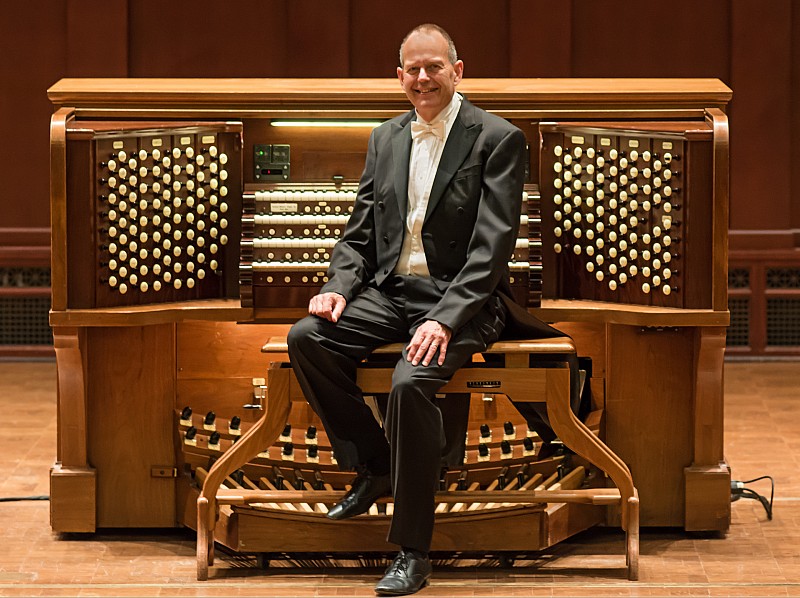Bach to the Start: U-M professor Dr. James Kibbie revisits J.S. Bach's complete organ works in a series of concerts as he prepares to retire after 42 years

On the evening of April 16, when Hill Auditorium fills with the opening notes of Johann Sebastian Bach’s famous Passacaglia and Fugue in C minor, University of Michigan organ professor James Kibbie will be on the precipice of completing an incredible achievement.
This work is the final of Bach’s 281 solo organ compositions that Kibbie will perform in his 18-concert series that began in September 2022. It's a monumental musical offering that marks the end of Kibbie’s 42-year tenure as professor of organ at the University of Michigan.
The concert series also marks the culmination of Kibbie’s life-long relationship with Bach’s music.
“I’ve been working on this a long time,” Kibbie says. “Some of the first simple pieces I learned on the organ were by Bach.”
The recitals represent the third time Kibbie has interpreted the full corpus of Bach’s organ music: He mounted a similar concert series on campus in 2000, and from 2007 to 2009 recorded these works on various historical organs across Germany. (You can download those recordings for free, along with an additional four works recorded in 2016.)
Kibbie’s unique experience with this repertoire enabled him to address the immense challenge of programming 18 performances that connect to one another and also succeed as standalone events.
“The really interesting thing is that the number of pieces in the series is growing," Kibbie says. "[W]hen I played [the complete Bach organ works] at the University of Michigan in 2000, it was 266 pieces. When I recorded them about 10 years later, it was 274 pieces. And this series that I’m doing now is 281.”
Kibbie says the reason for the increasing number of works is that “some of these pieces have only recently been authenticated. Some have been found in manuscripts and others were known, but until the last few years, there was some doubt as to whether Bach actually wrote them.”
For this current series of Bach concerts, Kibbie says he followed both current research and “personal choices” to determine exactly which works to program. One fascinating decision Kibbie made is to keep fragmentary works incomplete and he will perform these “as they exist in manuscript sources.”
Kibbie’s wealth of experience with this body of music allows him to approach the current concert series with unparalleled familiarity.
“I have a baseline of interpretation,” Kibbie says, adding that this round of performances is “different in detail.” This year’s concert programs mix organ works written for church services or based on sacred music with secular works that aim to showcase the performer’s ability. As Kibbie wrote at the concert series’ outset, he planned each performance to be “audience-friendly” and to stand alone as a “complete unit” so people who only attend a single performance “still experience the rich variety of Bach’s genius.”
Kibbie’s admiration for and personal attachment to each of the 281 compositions also influenced the way he organized this huge collection of music. As he explains, the Passacaglia and Fugue in C minor concludes the series because “it is the work, somehow, that I am closest to emotionally.” Kibbie first played the piece as a high school student in Iowa: “I’m sure the passage of time has something to do with it, but there is something about that piece that resonates with me.”
All but the final performance are held at the Blanche Anderson Moore Organ Recital Hall in the Earl V. Moore Building on the University of Michigan's North Campus. This space offers audiences a more historically informed experience, as its organ is modeled after instruments Bach admired during his career.
“There is no question the organ in Blanche Anderson Moore Hall is much more appropriate for the music of Bach,” Kibbie says.
The remaining concerts in Blanche Anderson Moore Hall take place on March 12, March 19, and April 2 before the series comes to its grand conclusion on April 16 in Hill Auditorium with Kibbie seated at the impressive Frieze Memorial Organ.
Whichever performances you are able to attend, Kibbie is sure you will hear exceptional music: “As far as I can see, there is no bad composition in all of the 281—every one of them has real merit.”
Garrett Schumann is a composer and music scholar who teaches in the University of Michigan’s College of Literature, Sciences & the Arts. His other writings have been published in The New York Times, Grove Music, and VAN Magazine.
James Kibbie's "The Complete Organ Works of J.S. Bach" recitals are all free though attendees are invited to make a donation to support the James Kibbie Scholarship Fund. Specific concert programs, commentary from Kibbie, and more information are available online. All the concerts are live-streamed (real-time only) at this location. There are four remaining concerts at Blanche Anderson Moore recital hall—March 12, March 19, and April 2—in the Earl V. Moore Building, 1100 Baits Drive, Ann Arbor. The final concert on April 16 is at Hill Auditorium, 825 N. University Ave, Ann Arbor.


































